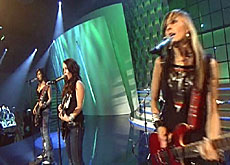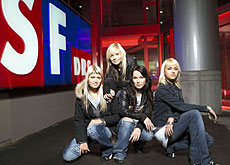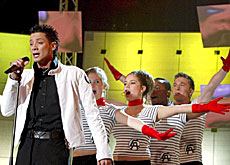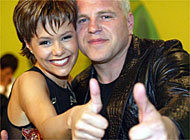Vanilla Ninja to rock for Switzerland

Switzerland’s entry to the Eurovision Song Contest will be hoping for more than "nul points" this weekend – the rock-bottom score awarded to the country last year.
In an effort to avoid another embarrassing flop, the Swiss have steered clear of home-grown talent by sending Estonian rock-pop outfit Vanilla Ninja to sing on behalf of the alpine nation.
Bookmakers have made the four-piece girl band one of the favourites to win the contest, which takes place in the Ukrainian capital, Kiev.
But the path to Eurovision glory has been anything but smooth, with Switzerland’s entry beset by problems in the run-up to the event.
Vanilla Ninja became embroiled in a scandal when it emerged that their Swiss-born manager had manipulated the German hit parade.
David Brandes admitted to buying 2,000 copies of chart singles by the Baltic band and by Gracia Baur, Germany’s Eurovision entry, in order to ensure maximum exposure ahead of the contest.
Vanilla Ninja’s two singles and albums were subsequently removed from the German charts.
The band members are now trying to distance themselves from the controversy.
“We try not to think about it too much. We want to keep our heads clear and concentrate on Kiev,” says lead singer Lenna.
Toni Wachter, head of entertainment at Swiss-German television, insists that there has been no such interference with the Swiss charts. But he admits that the practice of manipulating single and album sales is common in Europe.
Brandes is no longer with Vanilla Ninja and management of the band has been signed over to Christoph Helbig at a corporate-events company in Cologne, Germany.
Helbig’s firm has a track record of arranging concerts for the likes of David Bowie, U2, The Prodigy and Rage Against the Machine.
Competition
Twenty-four nations, including Switzerland, will compete in the finals of the 50th Eurovision Song Contest on May 21.
More than 100 million people are expected to watch Saturday’s live televised final.
Christoph Helbig says it’s a chance in a lifetime for the girl band – made up of lead singer Lenna, Katrin on keyboards, guitarist Piret and 16-year-old bass player Triinu.
“It’s fun, it’s very professional, and it’s a good chance to meet important international people,” says Helbig.
In the run-up to the competition, the group is trying to stay calm.
“We are trying to relax and be ready for this and give our best,” says Katrin.
Search for talent
The controversy over Vanilla Ninja’s management comes only a few months after an outcry over the selection of a non-Swiss band to represent the nation at Eurovision.
The decision to look outside Switzerland was seen at the time as a slap in the face for home-grown talent.
But Wachter defends the move, saying he cast the net wider than usual after repeated failures at the annual competition.
In recent years Switzerland has either failed to qualify for the competition or has ranked in the last six.
In 2004 Basel-based hairdresser Piero Esteriore suffered the ultimate Eurovision indignity of walking away from the semi-final contest in Turkey without a single point.
His song, Celebrate, was derided by music critics for its “simple melody” and “banal lyrics”.
“Really good Swiss bands were afraid to apply after all those bad results. They thought it would damage their image,” Wachter told swissinfo.
“We chose Vanilla Ninja because… the girls sound and look good and have wide appeal among young people.”
It’s not the first time that foreign artists have represented Switzerland at the annual contest.
Canadian singer Céline Dion made her European breakthrough after winning for Switzerland in 1988.
There is no stipulation in the Eurovision rules that national delegations must choose local artists for the contest.
Ninja info
The Baltic rock chicks who make up Vanilla Ninja grew up in the Estonian capital, Tallinn, and their first major public appearance was at the 2003 contest to choose Estonia’s Eurovision entry.
Their song was voted joint last by the international jury, although it was a favourite among Estonian television viewers.
Their first album sold 180,000 copies in Germany and total sales of albums and singles amount to 500,000, a respectable figure in a European music market only second in size to Britain and France.
At Eurovision, Vanilla Ninja will perform Cool Vibes from their Blue Tattoo album.
Helbig is promising surprises in terms of the girls’ appearance and the special effects they plan to use on stage.
If the bookies are anything to go by, they stand a good chance of success.
Betting agencies in Britain are predicting a third place for the young musicians.
It may not rocket them to Abba-style fame, but it would give Vanilla Ninja a leg-up in the highly competitive and not always honest international music scene.
swissinfo, Julie Hunt
The first Eurovision song contest was held in Lugano, Switzerland, in 1956.
Singer Lyss Assia won the competition for Switzerland that year with Refrain.
Swedish pop group Abba became one of the most famous bands of all time after performing Waterloo at the 1974 contest.
Swiss group Peter, Sue and Marc entered the competition four times.

In compliance with the JTI standards
More: SWI swissinfo.ch certified by the Journalism Trust Initiative




You can find an overview of ongoing debates with our journalists here. Please join us!
If you want to start a conversation about a topic raised in this article or want to report factual errors, email us at english@swissinfo.ch.